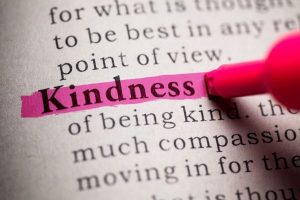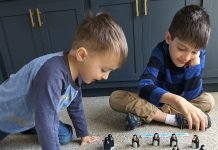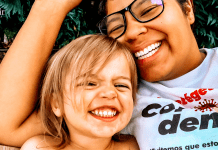Kind is the new cool
Everywhere you turn, the “be kind” message has taken us by storm.
 Public schools, Netflix specials, and monogrammed tees all tell us “Kind is the new cool.”
Public schools, Netflix specials, and monogrammed tees all tell us “Kind is the new cool.”
The campaign for kindness recognizes the problem of bullying, specifically, cyber-bullying and I’m grateful for the concerted effort in response to a serious issue.
I want kids to be kind. I want MY kids to be kind.
AND, I worry about the unintended consequences of teaching kindness to our most sensitive kids.
Can kindness be harmful?
My daughter won her school’s “kindness award” two years in a row. At 7 years old, we call her a “noticer.” She rushes to my younger son whenever he is hurt or frustrated. She knows the birthdays of her closest friends and carefully considers gifts for them. If there’s one frozen blueberry waffle left at breakfast, she lets her older brother have it because “blueberry is his favorite.” She’s the first to offer compassion for the villain on TV because “he probably just wants a friend.”
I’m grateful for her tender spirit. AND, I want her to know kindness isn’t all that matters.
Whether you call them sensitive, tenderhearted, or empaths, some kids are more naturally attuned to the people and feelings around them. They’re more able to empathize and show compassion. They’re caring and they listen well.
They’re also more likely to feel anxious.
They’re more likely to cave to peer pressure.
They’re more likely to enter into relationships that aren’t good for them.
When “be kind” is the only banner we wave, we don’t help our sensitive kids learn how to check in with themselves, trust themselves, and set boundaries.
The campaign for selfhood
Kindness campaigns develop empathy, but already-empathic kids need lessons in selfhood.
I taught my daughter how to say, “My ideas matter, too,” when her brother tries to steamroll her in a partnered activity.
I gave her permission to take the last blueberry waffle if she discovered it first because her needs matter, too.
I thanked her for always rushing to help her younger brother and reminded her she’s not responsible for him.
I taught her to use her “fire voice” and gave her permission to speak loudly and firmly when necessary.
When she won her most recent kindness award, we celebrated her, and when I tucked her in that night I told her, “You don’t have to be kind for me to love you. I will love you no matter what.”
I think it’s working.
Not long ago, she got invited to a birthday party and decided not to go. When I asked her about it, she replied, “Owen is only kind of my friend. He brags a lot about how smart he is.”
I tried to hide my smile before I responded, “Well, that’s rude of him. You don’t have to be friends with someone who makes you feel small.”
“I know,” she said and bounced out of the room.
Should we teach kindness to our kids?
 Yes, and…
Yes, and…
I want my kids to be kind and I want my kids to know how to check in with themselves, trust themselves, and take up space.
I want my kids to be kind and I want them to recognize unhealthy relationships and set boundaries when they’re needed.
We should teach kindness to our kids and we should be mindful of the tender kids who need lessons in selfhood.
Have a tender kid yourself? Try teaching these phrases:
“My needs matter, too.”
“My feelings matter, too.”
“My ideas matter, too.”
“I don’t have to fix this.”
“I can care about others without being responsible for their feelings.”
“I deserve to be treated well.”
















